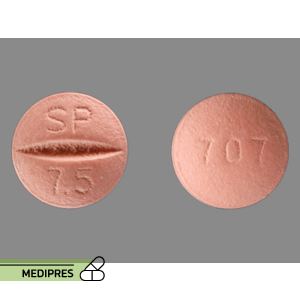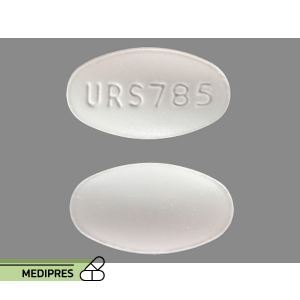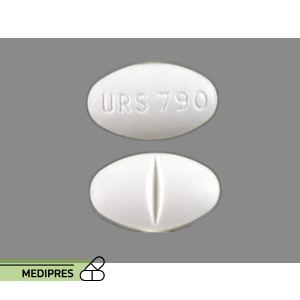
Unithroid
23 June, 2023
Uribel
23 June, 2023Upadacitinib
Generic name: Upadacitinib
Drug class: Antirheumatics
Dosage forms: Tablet
Root of administration: Oral
Dose: 15, 30, 45 mg
Mechanism of action: Upadacitinib belongs to a class of medications called Janus kinase (JAK) inhibitors. It works by decreasing the activity of the immune system.
Drug usage cases: Upadacitinib is used alone or with other medications to treat rheumatoid arthritis (a condition in which the body attacks its own joints causing pain, swelling, and loss of function) in people who are unable to take or have not responded well to one or more tumor necrosis factor (TNF) inhibitor medication(s). Upadacitinib is also used to treat psoriatic arthritis (a condition that causes joint pain and swelling and scales on the skin) in adults who are unable to take or did not respond to or tolerate one or more TNF inhibitor medication(s). Upadacitinib is also used to treat symptoms of eczema (atopic dermatitis; a skin disease that causes the skin to be dry and itchy and to sometimes develop red, scaly rashes) in adults and children 12 years and older who cannot use other medications for their condition or whose eczema has not responded to other medications. Upadacitinib is also used to treat ulcerative colitis (a condition that causes swelling and sores in the lining of the colon [large intestine] and rectum) in adults who are unable to take or who did not respond to one or more TNF inhibitor medication(s). Upadacitinib is also used to treat Crohn’s disease (a condition in which the body attacks the lining of the digestive tract, causing pain, diarrhea, weight loss, and fever) in adults who are unable to take or who did not respond to one or more TNF inhibitor medication(s). Upadacitinib is used to treat ankylosing spondylitis (a condition in which the body attacks the joints of the spine and other areas, causing pain, swelling, and joint damage) in adults who are unable to take or who did not respond to one or more TNF inhibitor medication(s). Upadacitinib is also used to treat active non-radiographic axial spondyloarthritis (a condition in which the body attacks the joints of the spine and other areas, causing pain and signs of swelling), but without changes seen on X-ray, in adults who are unable to take or who did not respond to one or more TNF inhibitor medication(s).
Drug contra indications: You should not take this medicine if you are allergic to upadacitinib. Before you start taking upadacitinib, tell your doctor if you have any signs of infection such as fever, sweating, chills, cough, body aches, tiredness, open sores or skin wounds, shortness of breath, diarrhea, stomach pain, weight loss, painful urination, or coughing up blood. To make sure upadacitinib is safe for you, tell your doctor if you have ever had:
a weak immune system or HIV; an active or chronic infection; tuberculosis (or if anyone in your household has tuberculosis); herpes zoster (also called shingles); any type of cancer; diverticulitis, an ulcer in your stomach or intestines; heart problems, heart attack, stroke, or blood clot; high cholesterol; chronic lung disease; eye problems (especially a problem with your retina); diabetes; low red or white blood cell counts; recently received or scheduled to receive any vaccine; are a current or past smoker; liver disease (especially hepatitis B or C); or kidney disease. Make sure you are current on all vaccines before you start using upadacitinib. Using upadacitinib may increase your risk of developing certain cancers, such as lymphoma, lung cancer or skin cancer. Ask your doctor about this risk.
Side effects: Get emergency medical help if you have signs of an allergic reaction to upadacitinib: hives, difficult breathing, swelling of your face, lips, tongue, or throat. Upadacitinib affects your immune system, and may cause certain white blood cells to grow out of control. Call your doctor right away if you have:
fever, swollen glands, night sweats; vomiting, diarrhea, weight loss; a new skin lesion, or a mole that has changed in size or color; weakness on one side of your body, problems with speech or vision; changes in your mental state; blood in your urine, burning when you urinate, little or no urination; or tenderness near the transplanted kidney. Some people taking upadacitinib have developed heart attacks, strokes, or serious blood clots. Seek emergency medical attention if you have:
heart attack symptoms – chest pain or pressure, pain spreading to your jaw or shoulder, nausea, sweating; signs of a stroke – sudden numbness or weakness (especially on one side of the body), severe headache, slurred speech, problems with vision or balance; signs of a blood clot in the lung – chest pain, sudden cough or shortness of breath, dizziness, coughing up blood; or signs of a blood clot deep in the body – pain, swelling, or warmth in one leg. upadacitinib may cause serious side effects. Call your doctor at once if you have:
wheezing, trouble breathing, severe or worsening cough; increased urination, pain or burning when you urinate; fever, chills, cough with mucus, chest pain, feeling short of breath; abnormal blood tests; signs of tuberculosis – fever, cough, night sweats, loss of appetite, weight loss, and feeling very tired; signs of shingles – flu-like symptoms, tingly or painful blistering rash on one side of your body; symptoms of herpes virus – cold sores around your mouth, skin sores or blisters, itching, tingling, burning pain in your thigh or lower back; signs of infection – fever, chills, sore throat, body aches, unusual tiredness, loss of appetite, bruising or bleeding; a hole (perforation) in your digestive tract – fever, severe stomach pain, change in bowel habits; or signs of hepatitis – loss of appetite, vomiting, stomach pain (upper right side), dark urine, clay-colored stools, jaundice (yellowing of the skin or eyes). Your treatment may be delayed or permanently discontinued if you have certain side effects.
Warnings: Taking upadacitinib may increase your risk of life-threatening medical problems including serious infections, a hole or tear in your digestive tract, a heart attack or stroke, blood clots, or cancer. Call your doctor right away if you have a fever, night sweats, constant tiredness, weight loss, stomach pain, diarrhea or changes in bowel habits, trouble breathing, wheezing, a severe cough, or lumps in your neck, armpits, or groin. Seek emergency medical attention if you have sudden shortness of breath, chest pain spreading to your neck or arms, nausea, severe dizziness, a cold sweat, weakness on one side of your body, slurred speech, or pain, redness, or swelling in an arm or leg. If you’ve had hepatitis B, it may come back or get worse. Tell your doctor if you don’t feel well and you have right-sided upper stomach pain, vomiting, loss of appetite, or yellowing of your skin or eyes.
Use during pregnancy or breastfeeding: You may need to have a negative pregnancy test before starting this treatment. May harm an unborn baby. Use effective birth control while using upadacitinib and for at least 4 weeks after your last dose. Tell your doctor if you become pregnant. Do not breastfeed while using upadacitinib, and for at least 6 days after your last dose.



